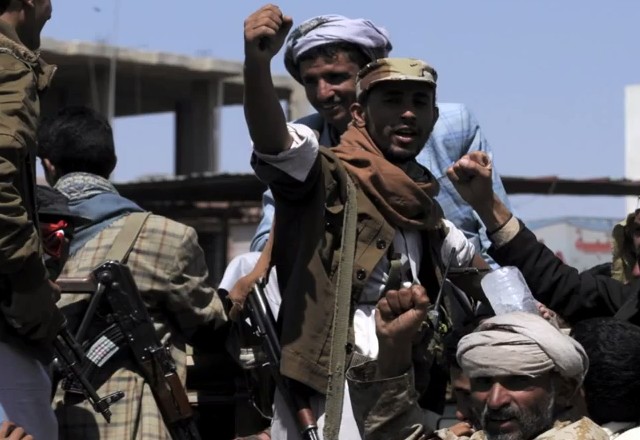Negotiations continue as war in Yemen rages on

Representatives from the Yemeni southern separatist movement are meeting in Oman this week with Houthi officials in an attempt to stall the fighting that has led to a humanitarian crisis in the impoverished nation. In addition, a coalition loyal to former Yemeni President Ali Abdullah Saleh has headed to Moscow for a meeting with Russian officials
(Lost track of who is fighting who in Yemen? The AP puts it this way: The fighting in Yemen pits the Houthis and allied troops loyal to Saleh against southern separatists, local and tribal militias, Sunni Islamic militants and loyalists of exiled President Abed Rabbo Mansour Hadi. The rebels seized the capital, Sanaa, in September.)
Meanwhile on the ground, anti-Houthi forces have managed to re-secure one of the border crossings between Yemen and Saudi Arabia. This crossing was being held by the Iranian-backed Houthi rebels as part of their retaliatory assault on Saudi Arabia; Saudi, determined to maintain its influence in the region in the face of a rising Iran, has for the past several months led an intense bombing campaign against Houthi strongholds. This, of course, has led to a massive anti-Saudi propaganda campaign on behalf of rebel fighters who seek to maintain their strategic hold on the region.
More from Reuters:
The Houthis say their seizure of the capital, Sanaa, in September and their spread throughout the country, which has run up against fierce resistance by local fighters, is a revolution against Hadi’s corrupt government and Sunni militants.Saba, the Houthi-run state news agency, quoted a military official as saying the border area had been taken by “a group of gunmen, al Qaeda militants and mercenaries”.The chief-of-staff for the pro-Hadi forces, General Mohammed Ali al-Maqdeshi, said border staff were struggling to cope with the waves of refugees.”There are thousands of people fleeing the hell of battles started by the militias against peaceful civilians which every day cause the number of those headed to the crossing to be even greater and resulted in a lack of services and overcrowding,” he wrote on his official Facebook page.
That lack of services has indeed led to a crisis in Yemen. The UN estimates that 80% of the population (around 20 million) is in need of some sort of humanitarian assistance, and this week reports from the World Health Organization revealed that officials have spotted more than 3,000 cases of Dengue Fever amongst the war-torn population.
Last week, WHO said Yemen’s health care system is on the verge of collapse. Several hospitals have been destroyed, medical workers killed and the country faces food, medical supply and fuel shortages. More than 2,800 people have been killed and 12,500 have been injured in the conflict since March 19, according to Yemen’s Ministry of Health.“Urgent action is needed to safeguard health facilities and ensure people caught up in the insecurity have access to health care,” says Dr. Ahmed Shadoul, WHO’s Yemen representative, said in a statement last week.WHO and Yemen’s Ministry of Health have set up an outbreak control response for dengue in the country, which includes an increase in mosquito nets and insecticide.
For Saudi Arabia, though, the purpose of this campaign is twofold: to protect their border and interests, and to send a message to Iran. However, the feeling on the ground has led some analysts to believe that this could backfire:
Plenty of Yemenis dislike and distrust the Houthis. But the bombing means that at least they can agree on a common enemy.I asked him about the Saudi statements that the Houthis are tools of Iran. He denied it.”This is not true. We have our own weapons, we have our own country and our own military… We told them if you have a feud with Iran, then attack them, not Yemen.”But for Saudi Arabia, sending a message to Iran is at least as important as trying to bend the Houthis to their will.Senior Saudis I spoke to when the bombing campaign started talked about the threat they perceived from Iran, not about the Houthis.
For now, Houthi rebels maintain a comfortable hold in key areas of Yemen; however, the Saudi coalition continues its campaign even amongst negotiations, and the anti-Houthi effort in general is backed by the UN, who has repeatedly called for the deposed Hadi government’s return to power. President Hadi first began to lose control of Yemen last September, when Houthi rebels seized control of strategically significant strongholds in the capital city of Sana’a.
CLICK HERE FOR FULL VERSION OF THIS STORY